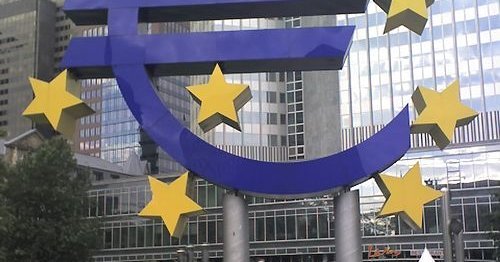Monetary stability is a prerogative to the growth and effectiveness of trade. With the end of Bretton Woods ‘system in 1973 and the adoption of floating exchange rates, European states sought to recover the monetary stability which had been undermined by too great changes in exchange rates.
Why the euro?
In 1979, officially started up the European Monetary System, which limited changes in exchange rates between European currencies. A country could not let its currency to be appreciated or devaluated too greatly from those of its neighbours. European states created an unit of account, the European Currency Unit (ECU), which was composed of different currencies of the EU, including the pound sterling.
European currencies would have to be linked with the ECU, which represented the “European monetary stability” and did not get its rate (+ / - 2.25%). These measures were intended to prevent one country to see its currency losing value relative to the others, and thus destabilizes the European area, economically interdependent.
During the 80s and especially in 1992-93, the European currencies were victims of speculative attacks that were destabilizing the entire system. The financial markets wanted to test the strength of these agreements on fluctuation margins and pushing the currencies to get out. The peseta and the pound sterling were not able to resist these pressures and came out at the end of 1992. The franc was attacked early 1993, the European states agreed to increase the fluctuation margins up to 15%, which was reflected by the end of the EMS.
Given the failure of control of parities, the idea of a common currency ending totally such monetary instability was increasing. The introduction of the euro was the result of a desire to create a permanently stable currency area in Europe to favour national economies. Thus in 1999, the euro was created.
The euro today is more than 17 countries and 331 million inhabitants
With about 27% of reservations of States, the euro is the second largest reserve currency in the world behind the dollar (61%) but ahead of the pound sterling (4.2%). The more the States denominate their reserves in euro, the more the stability of the currency strengthens. Indeed, they have no interest in seeing it depreciate too quickly, lest the value of their reserves down mechanically.
We have seen it in 2010, with the financial crisis with the dollar. The FED has flooded the markets with dollar, thinking to reduce the value of its currency. But confidence in the U.S. economy and the importance of the dollar for all economies is such that developing countries have bought massively.
By becoming an international currency, you reduce foreign exchange risks. Indeed, if everyone buys and sells in your currency, that happens with the dollar in some parts of the world, you no longer have to worry about the value of your currency as it becomes a unit for international trade.
We can therefore welcome the growing stature of the euro, which reflects the economic weight of Europe. The countries of West Africa plug into the euro to stabilize their economies. By developing our trade with other regions of the world, foreign currencies also cling to the euro which will facilitate trade with the rest of the planet.
And the story continues ...
The money is there, but the monetary policy is lacking. States want to have their cake and eat it. For a stable and benefit to all countries economic area, states must accept to lose their sovereignty over budget. Far from the disadvantage, everyone will see great benefits.
Greek and Irish crises are the result of this lack of cooperation. The markets are betting on the failure of the Union to assist its members in need. Although it has been slow to react, European states have reacted and have decided to show the world that they were united in creating a common fund.
A summit of euro zone states took place in late March in order to avoid such a crisis to happen again. The most reluctant Heads of State to provide assistance to Greece a year ago, are now the first to desire the standardization of budget and fiscal policies in the euro area. Angela Merkel has made a 180 degree turn which reflects the need to reach these cooperation mechanisms. Nationalism came to nothing else than disaster Greek and Irish.
The Commission had asked in 2005 the Greek auditing seeing irregularities. But she came up against the Council who did not want the EU institution to reach its sovereignty by looking at his accounts. It is this withdrawal which led to disaster response in the Greek crisis while greater integration would have enabled us to avoid spending the billions that Marine Le Pen and Nicolas Dupont Aignan never stop denouncing .
The history of the euro is therefore not limited to a mere addition of countries entering the euro area. This is not a succession of dates where each year we would welcome the entry of a new country. The history of the euro is simply the one of the integration of our already interdependent economies. It’s our ability to abandon our old nationalists demons to realize that it is in everyone’s interest to coordinate our economic policies.
Because we are a continent united in solidarity, because we are interdependent and because the difficulties of one country affect the whole continent, we must strengthen our integration mechanisms.
The history of the euro is not the Europeanist fable or the tragedy of nationalists but the story of the past, the present and the future of our lives.

Follow the comments: |
|
